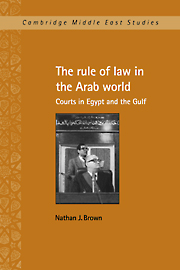Crossref Citations
This Book has been
cited by the following publications. This list is generated based on data provided by Crossref.
Goldberg, Jan
1998.
Réception du droit français sous les britanniques en Égypte : un paradoxe ?.
Égypte/Monde arabe,
p.
67.
Hefner, Robert W.
2000.
The New Cambridge History of Islam.
Zubaida, Sami
2000.
The New Cambridge History of Islam.
p.
269.
Bowen, John R.
2000.
Consensus and Suspicion: Judicial Reasoning and Social Change in an Indonesian Society 1960-1994.
Law & Society Review,
Vol. 34,
Issue. 1,
p.
97.
Elizabeth Mayer, Ann
2002.
Islamic Law as a Cure for Political Law: The Withering of an Islamist Illusion.
Mediterranean Politics,
Vol. 7,
Issue. 3,
p.
117.
Bowen, John R.
2003.
Islam, Law, and Equality in Indonesia.
Moustafa, Tamir
2003.
Law versus the State: The Judicialization of Politics in Egypt.
Law <html_ent glyph="@amp;" ascii="&"/> Social Inquiry,
Vol. 28,
Issue. 4,
p.
883.
Brown, Nathan J.
2003.
Regimes Reinventing Themselves.
International Sociology,
Vol. 18,
Issue. 1,
p.
33.
Merry, Sally Engle
2003.
From Law and Colonialism to Law and Globalization.
Law <html_ent glyph="@amp;" ascii="&"/> Social Inquiry,
Vol. 28,
Issue. 2,
p.
569.
Arjomand, Saïd Amir
2004.
Islam, Political Change and Globalization.
Thesis Eleven,
Vol. 76,
Issue. 1,
p.
9.
Brown, Nathan
2005.
Monarchies constitutionnelles et républiques non constitutionnelles.
Égypte/Monde arabe,
p.
89.
Warrick, Catherine
2005.
The Vanishing Victim: Criminal Law and Gender in Jordan.
Law & Society Review,
Vol. 39,
Issue. 2,
p.
315.
Kelly, Tobias
2005.
Law, Culture and Access to Justice under the Palestinian National Authority.
Development and Change,
Vol. 36,
Issue. 5,
p.
865.
Lust-Okar, Ellen
2005.
Structuring Conflict in the Arab World.
Dupret, Baudouin
2007.
What Is Islamic Law?.
Theory, Culture & Society,
Vol. 24,
Issue. 2,
p.
79.
Dupret, Baudouin
2007.
Science, Law, and the Body. Looking for Individual Agency and Responsability.
Égypte/Monde arabe,
p.
199.
Hikmet Malkawi, Bashar
2007.
Iraq’s accession to the WTO: Commitments and implications.
Journal of International Trade Law and Policy,
Vol. 6,
Issue. 2,
p.
14.
Arjomand, Saïd Amir
2007.
Islamic Constitutionalism.
Annual Review of Law and Social Science,
Vol. 3,
Issue. 1,
p.
115.
Gellman, Mneesha
and
Vuinovich, Mandi
2008.
From Sulha to Salaam: Connecting local knowledge with international negotiations for lasting peace in Palestine/Israel.
Conflict Resolution Quarterly,
Vol. 26,
Issue. 2,
p.
127.
Onley, James
2009.
Britain and the Gulf Shaikhdoms, 1820-1971: The Politics of Protection.
SSRN Electronic Journal,



